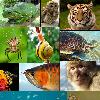

Summary Tags: Animal View |
Animalia regnum_authority = Linnaeus (Carolus Linnaeus), 1758 (Systema Naturae) subdivision_ranks = Phyla (Phylum) subdivision = * Subkingdom Parazoa ** Porifera (Sponge) ** Placozoa * Subkingdom Eumetazoa ** Radiata (unranked) *** Ctenophora *** Cnidaria ** Bilateria (unranked) *** Orthonectida *** Rhombozoa *** Acoelomorpha *** Chaetognatha *** Superphylum Deuterostomia **** Chordata **** Hemichordata **** Echinodermata **** Xenoturbellida **** Vetulicolia ? (extinction) *** Protostomia (unranked) **** Superphylum Ecdysozoa ***** Kinorhyncha ***** Loricifera ***** Priapulida ***** Nematoda ***** Nematomorpha ***** Lobopodia ***** Onychophora ***** Tardigrada ***** Arthropoda **** Superphylum Platyzoa ***** Platyhelminthes ***** Gastrotricha ***** Rotifera ***** Acanthocephala ***** Gnathostomulida ***** Micrognathozoa ***** Cycliophora **** Superphylum Lophotrochozoa ***** Sipuncula ***** Hyolitha ? (extinction) ***** Nemertea ***** Phoronida ***** Bryozoa ***** Entoprocta ***** Brachiopoda ***** Mollusca ***** Annelida ***** Echiura
Animals are a major group of mostly multicellular, eukaryotic organisms of the kingdom (Kingdom (biology)) Animalia or Metazoa. Their body plan eventually becomes fixed as they develop, although some undergo a process of metamorphosis (metamorphosis (biology)) later on in their life. Most animals are motile, meaning they can move spontaneously and independently. All animals are also heterotrophs, meaning they must ingest other organisms for sustenance.
Most known animal phyla (phylum) appeared in the fossil record as marine species during the Cambrian explosion, about 542 million years ago.
Fossil Range: Ediacaran - Recent fossilrange6100
Domain: Eukarya Taxobox_norank_entry taxon = Opisthokonta Taxobox_norank_entry taxon = Holozoa Taxobox_norank_entry taxon = Filozoa

